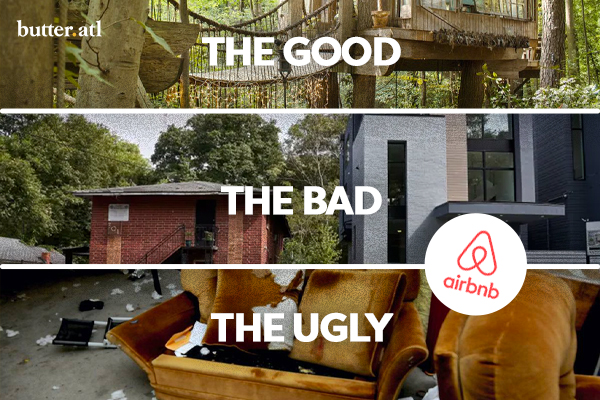The Churn
The Good, The Bad and The Ugly of Airbnb Coming to ATL
Butter ATLMarch 23, 2021

On February 18, Airbnb announced plans to open a technical hub in the city of Atlanta by the end of 2021. It’s yet another notable Atlanta arrival for a technology company that launched on the West Coast (Airbnb began in 2007 in San Francisco), and it certainly won’t be the last.
There are lots of reasons Atlanta continues to see rapid growth in the tech sector. Georgia Tech, Emory, the Atlanta University Center and other schools provide a constantly flowing resource for talent recruitment. There’s also the fact that Atlanta is a major transportation hub, with easy access to major Southern cities, and of course the world’s busiest airport.
Add in the fact that the cost of living, particularly compared with cities on the West Coast and the northeastern U.S., is very good for business.
These reasons and more are why Microsoft is on its way to town, taking over a large office tower next to Atlantic Station, and also expanding into the developing Quarry Yards and Quarry Hills on the westside, and south Fulton County and Douglas County, with an additional campus and data centers. T-Mobile is partnering with Georgia Tech to create a 5G incubator. Google, Twitter, IBM and others all have offices in Atlanta (Google’s also making a big expansion in Midtown soon) and of course there are lots of startups and tech companies that are headquartered here, including ShareCare, Kabbage and many others.
And while Amazon picked Virginia for its hyped HQ2 hub, the company employs around 4,000 people in the metro area and continues to expand its own ecommerce footprint.
The tech industry even has its own terrible nickname for Atlanta: Silicon Peach.
Still, the eminent arrival of an Airbnb hub in Atlanta is interesting for several reasons:
THE GOOD
There’s a lot of money to be made. Atlanta short-term rental hosts were able to use their properties to create revenue streams as the 2020 pandemic recession took hold. According to Laphonza Butler, Airbnb’s public policy director for North America, Atlanta hosts were able to earn more than $30 million, despite COVID-19’s effects on hospitality and tourism/travel.
Of course the absence of large scale events like DragonCon meant that hosts create more of their own marketing opportunities throughout the year, but depending on your location (proximity to green spaces helps), earnings near or above six figures have been available since 2018. According to ZipRecruiter, average annual pay for Atlanta Airbnb hosts is currently $29.3K, which is just under the national average of $30.8K as of March 21, 2021.
Airbnb’s ATL tech/engineering hub will also bring jobs to the city, and partnerships with Mayor Keisha Lance Bottoms, the NAACP, the Russell Center for Innovation and Entrepreneurship (RCIE), and others should help ensure diversity in the talent pool. And with so much opportunity coming from this, there’s an educational component as well, per this statement from Airbnb:
“Atlanta emerged as the city that aligned with what we are looking for in a technical hub. In particular, one of the things that stood out about Atlanta was its strong educational infrastructure when it comes to teaching the next generation of engineers, including educational institutions committed to specifically supporting communities of color.”
THE BAD
Gentrification still running rampant in Atlanta. Not only do longtime residents have to worry about displacement, but now there’s the possibility of having real estate investors come into the neighborhood, renovate a property and turn it into a place that is utterly extractive.
In New York City, studies cited by Curbed showed that Airbnb’s effects on housing availability led to an increase in the city’s median rent. There’s also the nature of capitalism: Commercial real estate investors are increasingly buying up property in order to take advantage of the short-term boom.
Airbnb is obviously aware that gentrification is an issue, and seems to have learned from the backlash that Amazon received as it put the location for HQ2 up for cities to bid. The company has made public goodwill toward the hub’s arrival part of its strategy, and has promised to donate economic incentives and tax credits back to the city for community impact initiatives.
THE UGLY
Let’s not pretend that everyone taking advantage of short-term rental housing is a good steward or tenant. Horror stories abound.
Airbnb cracks down on 50 Atlanta party houses https://t.co/eoQmdfLW1C
— AJC (@ajc) August 11, 2020
2 people injured in a shooting at an Atlanta @Airbnb. This is the 131st reported shooting at a short term rental since 5/2019. #HomesNotHotels#NeighborsNotStrangers#AirbnbSucks https://t.co/81ismGpfb9
— Jessica Sheedy Black (@jjsheedy) September 6, 2020
Reading about someone who leased 18 units in Atlanta (making housing more expensive) and made tons of money listing them on Airbnb is now freaking out because they can’t pay the rent on 18 units and doesn’t know what to do has me all:
— John J. Bauters (@JohnBauters) May 18, 2020
BuT tHaT’s HoW tHe mArKeT wOrKs pic.twitter.com/n4xEwoWSNQ
And just imagine finding your property like this after renting it out to someone you don’t know. During a pandemic.
The Atlanta City Council just set new rules for Airbnb hosts. In a 13-1 vote, a short-term rental ordinance was approved just last week, creating new responsibilities for those who choose to make properties available through Airbnb, VRBO and other such platforms, in order to combat the proliferation of “party houses.”
In addition to applying for a permit (and paying a nonrefundable $150 application fee), hosts will be responsible for paying the 8% hotel-motel tax in Georgia, and will pay $300 penalties for violations of rules, with properties facing one-year licensing bans if three violations are documented.
However it shakes out, Airbnb seems smitten with Atlanta, and there will be those who see the good and bad (and ugly) in any company with such consequential power moving into the city.

